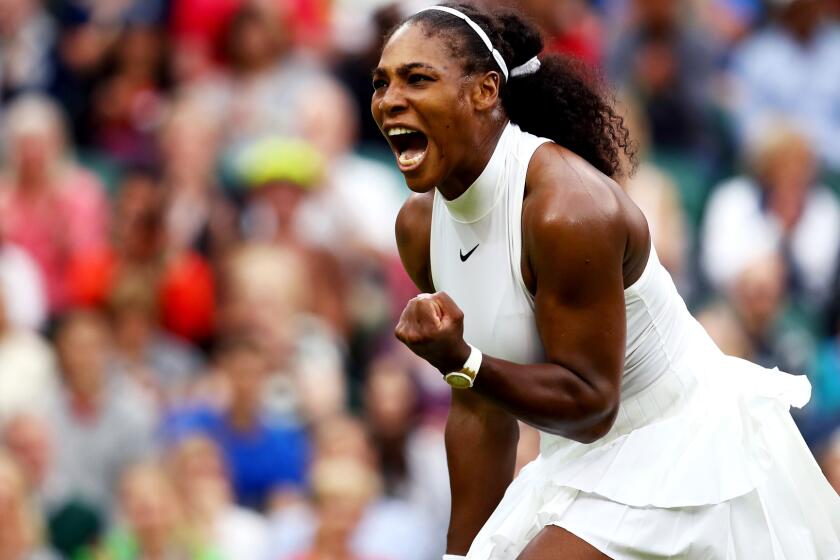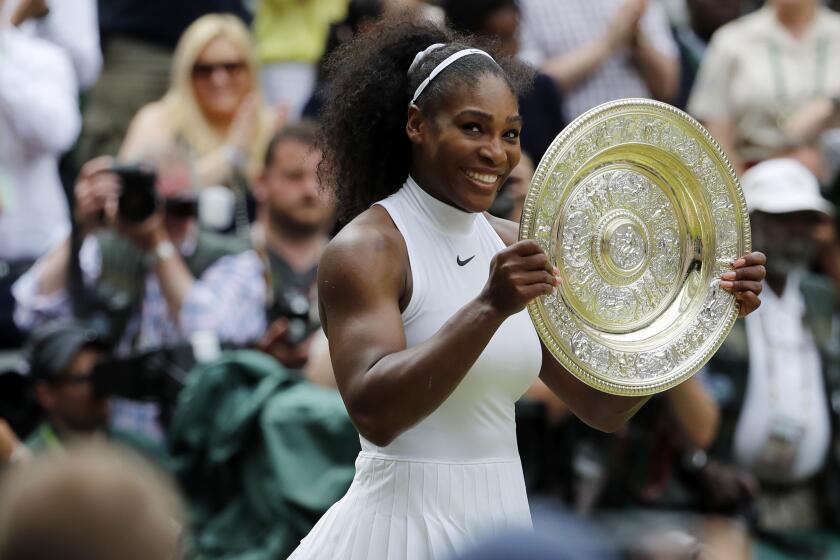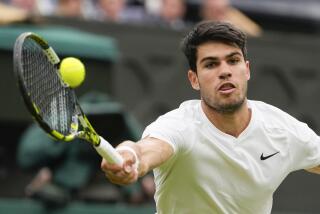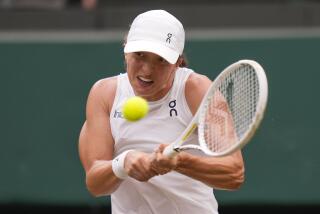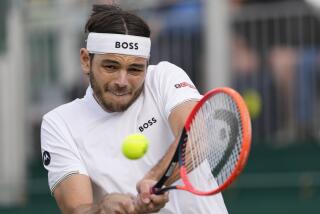Column: Serena Williams showcases championship instincts in her winning return to tennis
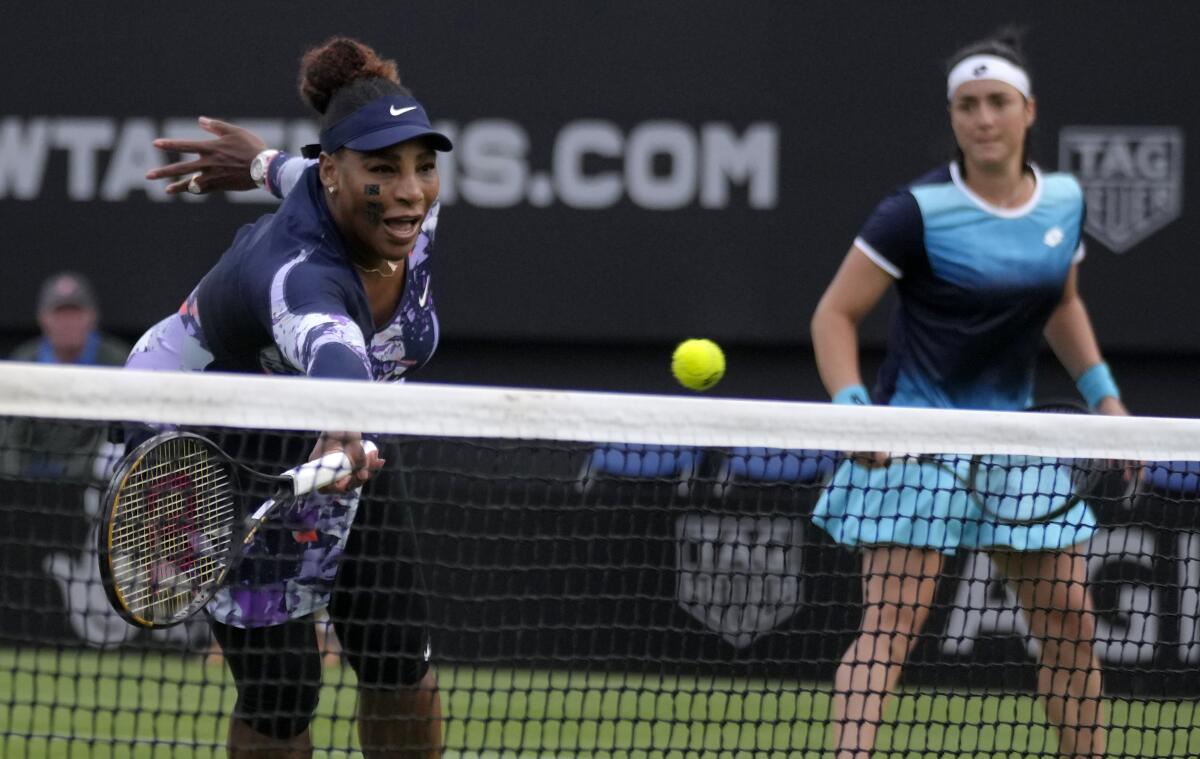
- Share via
Serena Williams’ game was rusty, but the instincts that have made her an enduring champion carried her to a win in her return to the sport she had dominated for so long.
Williams, 40, ended a nearly yearlong absence from tennis Tuesday by teaming with Ons Jabeur of Tunisia to defeat Sara Sorribes Tormo of Spain and Marie Bouzkova of Czechia 2-6, 6-3, 13-11 at the Rothesay International tournament at Eastbourne, England.
Their pairing was a surprise and their lack of familiarity was apparent early against the experienced duo of Sorribes Tormo and Bouzkova, but Williams surged as the match progressed.
“I caught some fire behind me,” Williams said in a post-match interview on the Tennis Channel. “They played really well in that first set. They were jamming.”
The victory gave her much-needed match experience before she returns to singles play next week as a wild-card entrant at Wimbledon. Williams has won seven of her 23 Grand Slam event singles titles at Wimbledon, earning her most recent triumph there in 2016. “Oh, my God, it was so fun to play with Ons,” Williams said.
Fans have watched Serena Williams grow up before their eyes. Now she is watching her daughter grow up while maintaining the drive to win. The balance isn’t so easy.
Williams served to open the match Tuesday and produced some occasional glimpses of her fearsome old serve. She became more comfortable as the match went on, moving better, going to the net with confidence and mixing in good volleys as she regained her touch. She also was able to shrug off a stumble on the grass in the sixth game of the second set, quashing memories of the mishap that had kept her off the court and derailed her pursuit of Margaret Court’s record of 24 Grand Slam event singles titles.
Before Tuesday, Williams hadn’t competed since last June 29, when she slipped on the grass during her Wimbledon first-round singles match against Aliaksandra Sasnovich and retired because of an ankle injury. She remains second to Court with 23 Slam singles titles.
Williams didn’t need to play again to cement her legacy as one of the sport’s greatest competitors and a compelling source of inspiration, especially to women of color who might not have previously seen an elite athlete who looks like them. She came back because of the competitiveness that fueled her rise from the courts of Compton to the world stage, a determination that will be tested by opponents who are match-fit and sometimes two decades younger.
It was never clear whether she would return because she has many other interests. Besides being the mother of 4½-year-old daughter, Olympia, she has a large endorsement portfolio and heads a venture capital firm called Serena Ventures, which launched an $111-million early stage fund this year to boost companies founded by women, Black and Latino entrepreneurs.
She also was credited as an executive producer of the 2021 movie “King Richard,” the story of her father, Richard, and his relentless pursuit of stardom for her and her sister Venus. It was nominated for six Academy Awards and won one, for Will Smith for lead actor as Richard Williams.
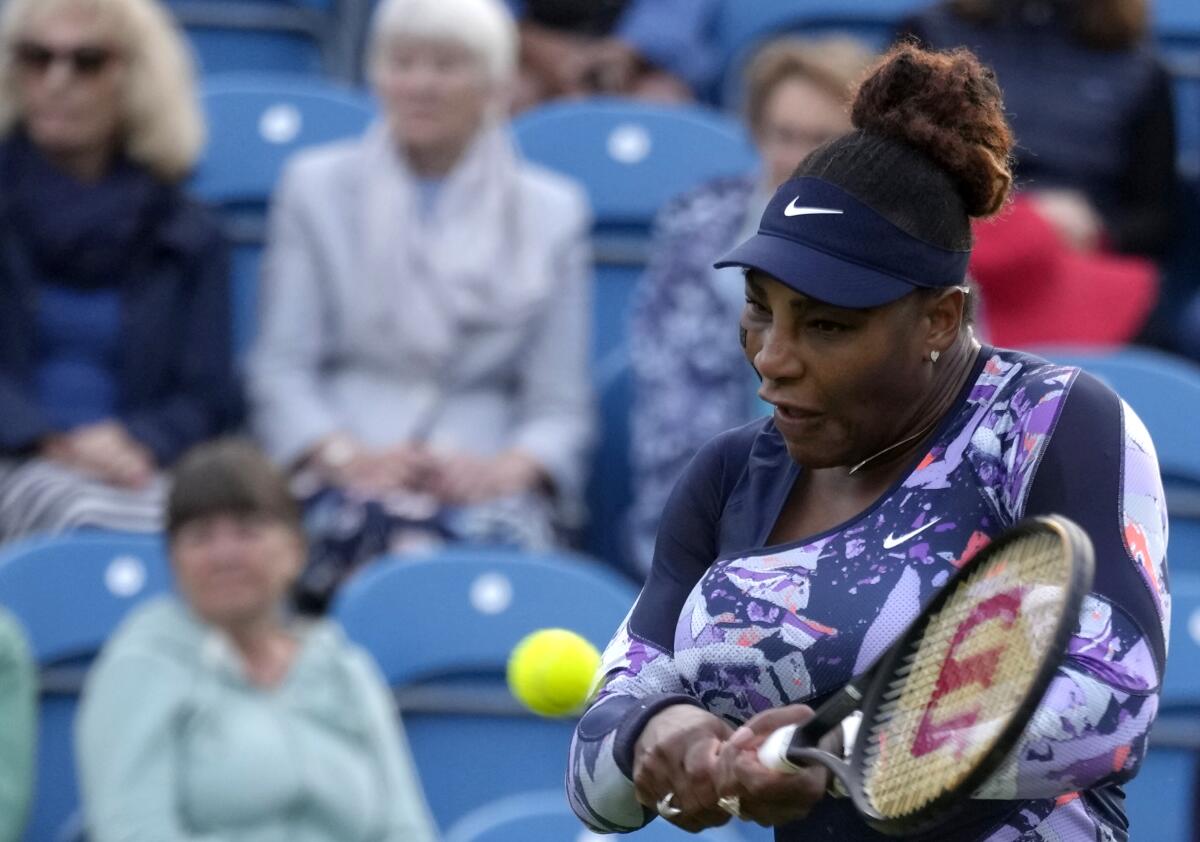
Doubts about her return intensified in April when her coach, Patrick Mouratoglou, became Simona Halep’s full-time coach. He took that job, he said, only after he spoke to Williams.
“The door opened for me, at least short term, to work with someone else,” he said. And Williams hadn’t posted practice videos or photos on social media, as players often do to update their fans, though she posted about her business and social activities.
Her decision to play doubles at Eastbourne was smart because it should ease her transition back to singles competition. It came about when her coach, Eric Hechtman, reached out to Jabeur’s coach, Issam Jellali, before the French Open to ask whether Jabeur would be interested in teaming with Williams at Eastbourne. Jabeur, who has risen to a career-best No. 3 in the world, kept their agreement a secret until a few days ago.
“I’m really lucky that she picked me. I’m pretty glad that I can share the court with her,” Jabeur said during a media session before the Eastbourne tournament. “I always watched Serena playing and always supported her. She’s such a legend and such an example for our sport.”
Williams ranked No. 8 in the world at Wimbledon last year. She’s No. 1,204 as she returns to a drastically changed landscape on the women’s tour.
Ash Barty, ranked No. 1 when she won Wimbledon last year, retired after she won this year’s Australian Open and is no longer ranked. Then-No. 2 Naomi Osaka has dropped to No. 42 after skipping several tournaments to tend to her mental health and after being hampered by a sore Achilles tendon. Halep, No. 3 a year ago, was No. 19 when the latest rankings were released Monday.
Only two women who ranked in the top 10 entering Wimbledon last year remain there: Iga Swiatek of Poland, who was then No. 9 and has soared to No. 1 on the strength of a 35-match winning streak, and Aryna Sabalenka, who was No. 4 a year ago and is No. 6 now.
Serena Williams, winner of 23 Grand Slam titles, has not competed since getting injured during the first set of her first-round match at Wimbledon last year.
Williams hasn’t won a Slam singles title since the Australian Open in 2017, when she was in the early stages of her pregnancy. In 2018 and 2019, she reached the finals at Wimbledon and the U.S. Open but lost all four times in straight sets.
It’s never wise to count her out. And grass is a good surface for her, especially if she still has her powerful serve. But the new depth on the tour and her lack of recent competition will create significant obstacles.
“It’s a long time not to play,” 2021 Wimbledon runner-up Karolina Pliskova said in a pre-Eastbourne interview. “She’s not the youngest, and the body takes time to get back in the shape of playing matches and tournaments. It’s still very different to just practicing.
“But of course, she’s an amazing player and she has achieved so much. I think a number of players will be super scared to play her. This is her advantage, but let’s see her level.”
The Wimbledon draw will take place Friday. “Of course I don’t want to play against her,” world No. 4 Paula Badosa said. “I hope the draw goes for another player because no one wants to play against Serena, and less on grass. Let’s pray for that.”
It would have been unbearably sad if her tearful exit from Wimbledon last year had been the last sight of her in a competitive match. Her comeback is a gift for her, for tennis and for all who appreciate the power of one woman to not only win trophies but to change the world.
More to Read
Go beyond the scoreboard
Get the latest on L.A.'s teams in the daily Sports Report newsletter.
You may occasionally receive promotional content from the Los Angeles Times.

